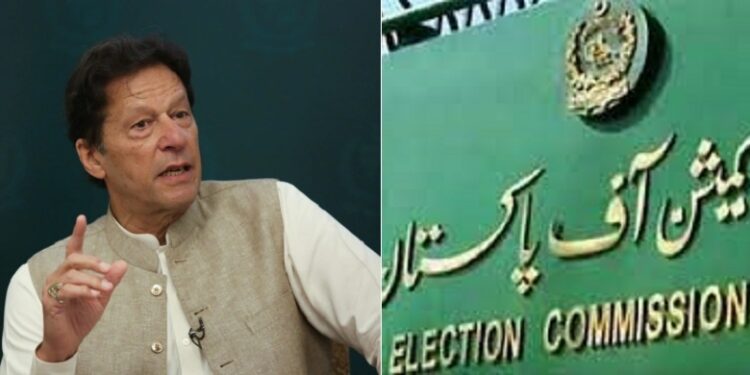The former prime minister has a right to due process, and the apex court has the final say in the matter, but it is difficult to see how he can get away with it.
By Ahmer Kureishi
If some Pakistan Muslim League-Nawaz (PML-N) leaders expected the Election Commission of Pakistan (ECP) to burn Imran Khan at stake, well, their hopes have not prospered. But if you look at the ruling handed down by Chief Election Commissioner Sikandar Sultan Raja and his two colleagues, you cannot help appreciating a job well done.
Every last word of the 70-page order announced on August 2, 2022, speaks to the gravitas called for in such a serious matter and expected of a constitutional institution of the ECP’s stature.
This was important to put on the record, not least because CEC Raja and members Nisar Ahmed Durrani and Shah Muhammad Jatoi are unlikely to receive the credit they deserve for authoring such a compelling legal document amid these times of political polarisation.
The order has no inflammatory rhetoric, no extraneous remarks, and no legally dubious language – just 50 paras of a damning indictment of the conduct of the former prime minister and his Pakistan Tehreek-e-Insaf (PTI) party.
It is a marvel how a political party could amass funding from means clearly prohibited under the law, and go to ridiculous lengths to hide it afterward.
The order documents 34 instances of PTI receiving funding from foreign nationals and 351 instances of tapping companies incorporated in foreign jurisdictions.
With help from the State Bank of Pakistan (SBP), the Commission was able to unearth 13 bank accounts – in addition to the 8 PTI declared and owned – used to funnel these funds to Pakistan.
The leader who accuses everybody else of being a thief was caught lying when he signed a ‘grossly inaccurate’ Form 1, certifying a thoroughly fudged statement of party accounts as factual.
The ECP ruling aptly puts the ball for further action in the court of the federal government, who is required under the law to file a reference against any political party found receiving foreign funding.
The government is further obligated to refer the matter to the Supreme Court of Pakistan (SCP) within fifteen days of the gazette announcement. If the court upholds the declaration, PTI will “stand dissolved forthwith”.
In addition, the falsification of Form 1 also warrants a reference against Khan under Articles 62 and 63 of the Constitution, which entails disqualification for life from holding public office.
If the ECP order turns out to be as legally watertight as some experts are saying it is, this may be the end of Khan as a political player. On the other hand, the order warrants the beginning of a series of investigations into the affairs of Khan and PTI.
The authorities must unearth the full details of the unknown accounts used for money laundering and establish how the foreign funds helped Imran Khan and how he helped his donors – whether individuals or companies – in return. The auditors who signed off on PTI’s falsified accounts must also face the music.
Separately, the Pakistan Democratic Front (PDM) has already submitted another reference over his handling of Toshakhana gifts under the same constitutional provisions for the consideration of the Election Commission of Pakistan (ECP). This is in addition to the proceedings the government is required to initiate against PTI on account of it being a foreign-funded party. The government first needs to make a declaration of the fact by notification in the official Gazette.
Then there are other allegations of illegal foreign funding thrown around the media by PTI’s former overseas leaders Fauzia Kasuri and Ahmed Jawad – and the ones brought to light by Financial Times. It is noteworthy how Khan has shown no inclination to sue Financial Times or the reporter who published the story of Arif Naqvi’s shenanigans like Wootton Cricket to allegedly launder lucrative “donations” from a Dubai royal and others. Given how strict Britain’s libel laws are, suing the publisher and the reporter would be a foregone conclusion – unless Khan was sure of his own culpability.
In political terms, the ECP ruling may have irreparably damaged Imran Khan’s narrative of “imported government”. How can a leader catch receiving foreign funding himself accuse others of taking their cue from foreign powers? How can a party found obtaining funds from India – among 34 countries – accuse others of being soft on India?
All these interlocking developments point toward Khan’s imminent elimination as a political player. He no doubt has a right to due process, and the Supreme Court of Pakistan (SCP) will have the final say in these matters, but it is difficult to see how the Pakistani version of Teflon don can wriggle out of all these damning charges to emerge as a viable political force once more.
PTI’s pushback against these development has begun, but it seems quite feeble going by the party’s own history of going haywire over the slightest provocation. The public protest demos called by Khan against the ECP order have failed to impress. A reference brought by PTI has been withdrawn – reportedly to be filed after more substantiation. This, too, looks like a political gimmick rather than a legal defence.
Do Khan and his PTI colleagues realise that as a rule, political pushback is of little utility in legal matters? More to the point, do they realise the long arm of law is finally catching up with the man who has for years paid lip service to equality before the law for all without regard to a social station or political stature? If they do, what is their strategy to stay alive as a political force once Khan and his key aides are eliminated from the field and PTI ceases to exist? Only time will tell.
Copyright © 2021 Independent Pakistan | All rights reserved




